This article needs additional citations for verification .(April 2019) |
The Mystic Wood is a board game published in 1980 by Philmar Ltd., and in 1983 by The Avalon Hill Game Company.
This article needs additional citations for verification .(April 2019) |
The Mystic Wood is a board game published in 1980 by Philmar Ltd., and in 1983 by The Avalon Hill Game Company.
The Mystic Wood is a game in which knights from the age of chivalry journey through both normal and enchanted woods on a personal quest. [1]
Fantasy Games Unlimited became the American distributor for Philmar/Ariel Games in the late 1970s, and were therefore able to distribute Mystic Wood, although a new edition was published two years later by Avalon Hill. [2] : 73
Andy Davidson reviewed the Philmar version of The Mystic Wood for White Dwarf #20, giving it an overall rating of 9 out of 10, and stated that "This game is similar to Terence Donnelly's other fine adventure game, Sorcerer's Cave, but is a much cleaner, tighter design. It is simple enough to be a good fun game but is sufficiently complex to allow the development of different strategies and interesting tricks. Most important, it seems to lack the aimlessness that characterises most of these adventure games. I recommend it highly." [3]
Steve Condit reviewed the Avalon Hill version of The Mystic Wood in Space Gamer No. 73. [1] Condit commented that "The Mystic Wood is a good beer-and-pretzels game, ideal for finishing off an evening of long games. It is not good solitaire. If you enjoy Dungeon! or The Castle, but this one; it is the best of the three." [1]
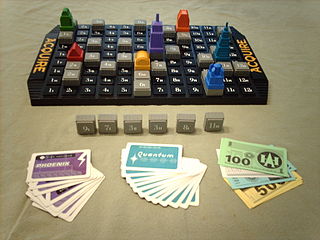
Acquire is a board game published by 3M in 1964 that involves multi-player mergers and acquisitions. It was one of the most popular games in the 3M Bookshelf games series published in the 1960s, and the only one still published in the United States.

RuneQuest is a fantasy tabletop role-playing game originally designed by Steve Perrin, Ray Turney, Steve Henderson, and Warren James, and set in Greg Stafford's mythical world of Glorantha. It was first published in 1978 by The Chaosium. Beginning in 1984, publication passed between a number of companies, including Avalon Hill, Mongoose Publishing, and The Design Mechanism, before finally returning to Chaosium in 2016. RuneQuest is notable for its system, designed around percentile dice and an early implementation of skill rules, which became the basis for numerous other games. There have been several editions of the game.

Traveller is a science fiction role-playing game first published in 1977 by Game Designers' Workshop. Marc Miller designed Traveller with help from Frank Chadwick, John Harshman, and Loren Wiseman. Editions were published for GURPS, d20, and other role-playing game systems. From its origin and in the currently published systems, the game relied upon six-sided dice for random elements. Traveller has been featured in a few novels and at least two video games.

Titan is a fantasy board game for two to six players, designed by Jason B. McAllister and David A. Trampier. Each player controls an army of mythological creatures such as gargoyles, unicorns, and griffons, led by a single titan. The titan is analogous to the king in chess in that the death of a titan eliminates that player and his entire army from the game. The player controlling the last remaining titan wins the game. The game was first published in 1980 by Gorgonstar; the rights were later licensed to Avalon Hill and Valley Games. Upon its release, the game received positive reviews.
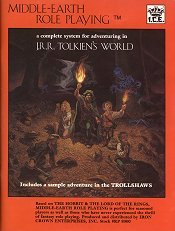
Middle-earth Role Playing (MERP) is a 1984 role-playing game based on J. R. R. Tolkien'sThe Lord of the Rings and The Hobbit under license from Tolkien Enterprises. Iron Crown Enterprises (I.C.E.) published the game until they lost the license on 22 September 1999.

Louis Zocchi is a gaming hobbyist, former game distributor and publisher, and maker and seller of polyhedral game dice. In 1986, he was elected to the Charles Roberts Awards Hall of Fame.
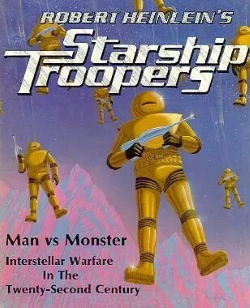
Starship Troopers is a board wargame by Avalon Hill based on the 1959 novel of the same name by Robert A. Heinlein. It was originally released in 1976 and designed by Randall C. Reed. Twenty years later, Avalon Hill redesigned and re-released a "movie" version in 1997 to coincide with the movie's release.

Cosmic Encounter is a science fiction–themed strategy board game designed by "Future Pastimes" and originally published by Eon Games in 1977. In it, each player takes the role of a particular alien species, each with a unique power to bend or break one of the rules of the game, trying to establish control over the universe. The game was inducted into the Academy of Adventure Gaming Arts & Design Adventure Gaming Hall of Fame in 1997.

Kingmaker is a board game published in the UK by PhilMar Ltd. in 1974 that simulates the political struggles to place a king on the throne of England during the Wars of the Roses. The game was popular, and other editions, including a computerized version, were produced by Avalon Hill, TM Games, and Gibsons Games. The game won a Charles S. Roberts Award in 1976.
Metagaming Concepts, later known simply as Metagaming, was a company that published board games from 1974 to 1983. It was founded and owned by Howard Thompson, who designed the company's first game, Stellar Conquest. The company also invented Microgames and published Steve Jackson's first designs, including Ogre, G.E.V. and The Fantasy Trip.

Magic Realm is a fantasy adventure board game designed by Richard Hamblen and published by Avalon Hill in 1979. Magic Realm is more complex than many wargames and is somewhat similar to a role-playing game. It can be played solitaire or with up to 16 players and game time can last 4 hours or more. The game board is a type of geomorphic mapboard constructed of large double-sided hexagon tiles, ensuring a wide variety of playing surfaces.
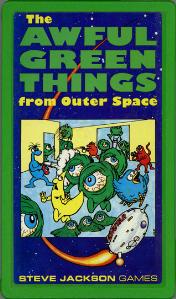
The Awful Green Things from Outer Space (AGTFOS) is a two-player space combat board game developed and illustrated by Tom Wham.

The Sorcerer's Cave is a fantasy board/card game designed by Terence Peter Donnelly and first published in 1978. Though greatly simplified, it was inspired by the fantasy role-playing game Dungeons & Dragons. Unlike D&D, however, Sorcerer's Cave does not require "Dungeon Master" or referee. One of its strengths is that it can be played solo or competitively, as well as cooperatively. Another is the diplomatic aspect of interactions between players with changing agendas. In general, player(s) gather and control a party of adventurers who explore a multi-level dungeon that is randomly generated by drawing area cards from a deck. Encounters include special rooms, traps, monsters, allies, magical items and treasures.

The original Dungeons & Dragons boxed set by Gary Gygax and Dave Arneson was published by TSR, Inc. in 1974. It included the original edition of the Dungeons & Dragons fantasy role-playing game. Its product designation was TSR 2002.
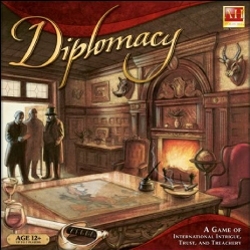
Diplomacy is a strategic board game created by Allan B. Calhamer in 1954 and released commercially in the United States in 1959. Its main distinctions from most board wargames are its negotiation phases and the absence of dice and other game elements that produce random effects. Set in Europe in the years leading to the Great War, Diplomacy is played by two to seven players, each controlling the armed forces of a major European power. Each player aims to move their few starting units and defeat those of others to win possession of a majority of strategic cities and provinces marked as "supply centers" on the map; these supply centers allow players who control them to produce more units. Following each round of player negotiations, each player can issue attack and support orders, which are then executed during the movement phase. A player takes control of a province when the number of provinces that are given orders to support the attacking province exceeds the number of provinces given orders to support the defending province.
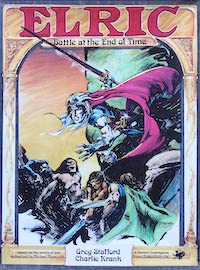
Elric: Battle at the End of Time is a board wargame published by Chaosium in 1982, an update of the 1977 game simply titled Elric. It is based on the Elric of Melniboné books by Michael Moorcock. There have been three English language editions, Elric (1977), Elric: Battle at the End of Time (1982), and Elric (1984), published by Avalon Hill.

Wizard's Quest is a fantasy board wargame published by Avalon Hill in 1979.

The Legend of Robin Hood is a board game published by Operational Studies Group (OSG) in 1979, and later republished by Avalon Hill that is based on the legendary outlaw Robin Hood and his nemesis, the Sheriff of Nottingham.
4th Dimension is a 1979 board game published by TSR.

Griffin Island is a boxed tabletop role-playing game supplement for RuneQuest. Originally published by Chaosium in 1981 as Griffin Mountain, a set of adventures set in the world of Glorantha, this edition was published in 1986 by The Avalon Hill Game Company as part of its third edition RuneQuest rules set. It was written by Rudy Kraft, Jennell Jaquays, Greg Stafford, and Sandy Petersen. Griffin Island contained role-playing material to help gamemasters design adventures in the setting. It received positive reviews in game periodicals including Casus Belli, White Dwarf, Dragon, Space Gamer/Fantasy Gamer, The Games Machine, and Games International.